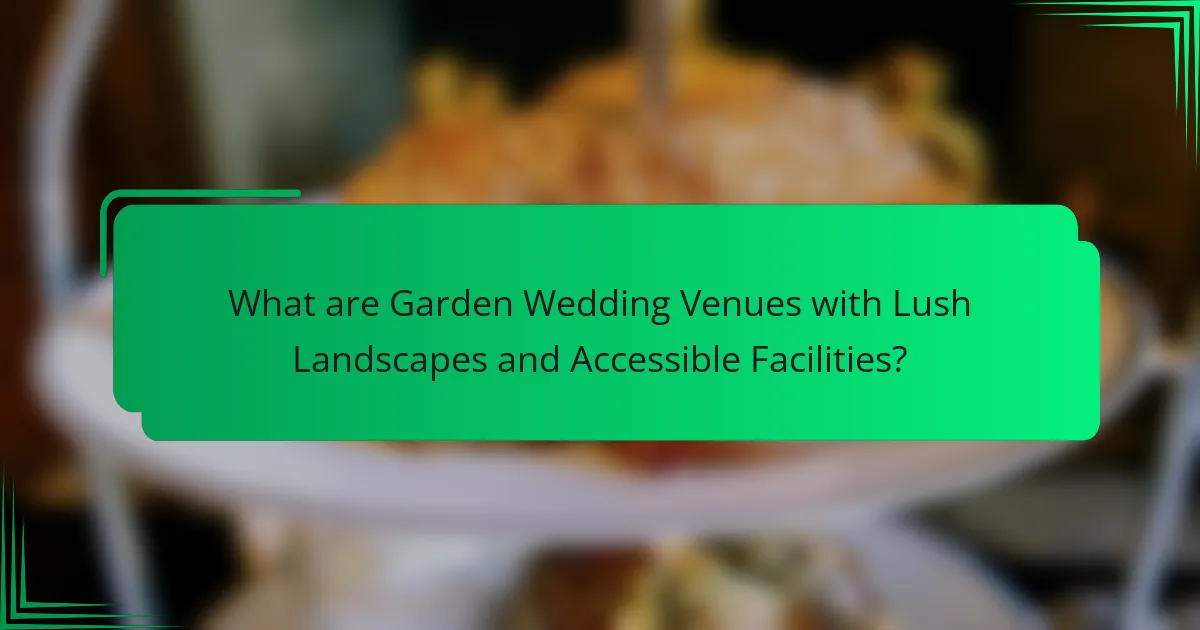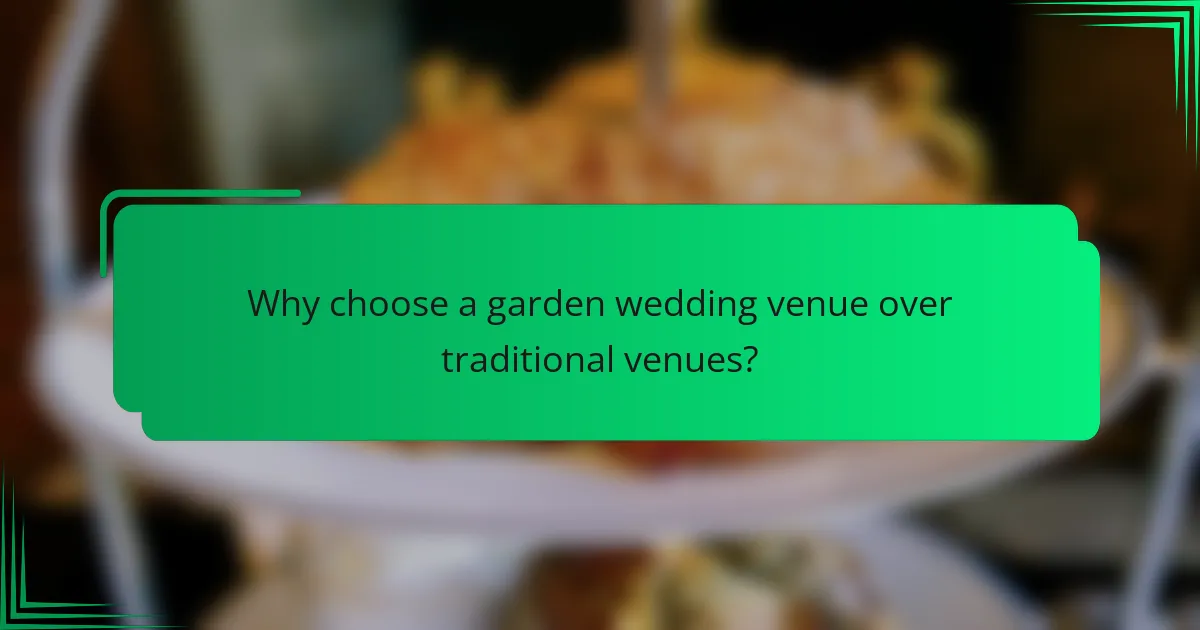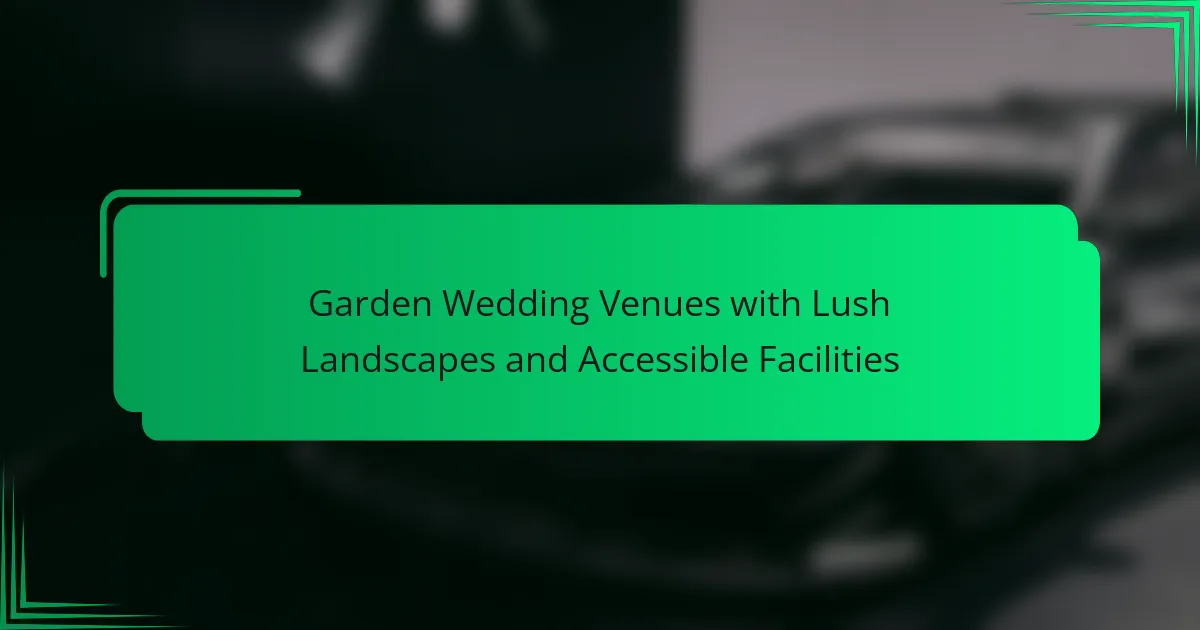Garden wedding venues are outdoor locations characterized by lush landscapes and accessible facilities specifically designed for weddings. These venues typically include beautiful gardens, greenery, and scenic views, with essential accessibility features such as paved walkways and restrooms for individuals with disabilities. Couples benefit from the natural beauty of these settings, which often enhance the ceremony’s aesthetic while reducing decoration costs. Key considerations for selecting a garden venue include its location, accessibility, capacity, available amenities, weather contingency plans, and venue policies. Overall, garden wedding venues offer a unique combination of beauty, convenience, and cost-effectiveness for couples planning their special day.

What are Garden Wedding Venues with Lush Landscapes and Accessible Facilities?
Garden wedding venues with lush landscapes and accessible facilities are outdoor locations designed for weddings. These venues typically feature beautiful gardens, greenery, and scenic views. Accessibility is a key attribute, ensuring all guests can navigate the space comfortably. Many venues offer paved walkways, ramps, and restrooms designed for individuals with disabilities. Examples include botanical gardens and estates with manicured lawns. Such venues often provide amenities like seating, catering options, and event planning services. The combination of natural beauty and accessibility makes these venues popular for couples seeking a picturesque wedding setting.
How do lush landscapes enhance the garden wedding experience?
Lush landscapes enhance the garden wedding experience by providing a visually stunning backdrop. The vibrant colors of flowers and greenery create a romantic atmosphere. Natural elements like trees and water features contribute to a serene setting. This ambiance promotes relaxation and enjoyment among guests. Research indicates that natural environments can reduce stress and enhance mood. A study by Kaplan and Kaplan (1989) shows that exposure to nature positively affects emotional well-being. Moreover, lush landscapes offer diverse photo opportunities, capturing memorable moments. Overall, these features elevate the overall aesthetic and emotional impact of the wedding.
What types of plants and flowers are commonly found in these venues?
Commonly found plants and flowers in garden wedding venues include roses, hydrangeas, and peonies. Roses are popular for their classic beauty and fragrance. Hydrangeas offer vibrant colors and a lush appearance. Peonies are favored for their large blooms and romantic feel. Other common plants include lavender, which adds a soothing scent, and ferns, providing greenery and texture. These selections enhance the aesthetic appeal of the venue. Additionally, seasonal flowers are often incorporated to match the wedding theme.
How does the natural scenery contribute to wedding photography?
Natural scenery enhances wedding photography by providing stunning backdrops. Lush landscapes create vibrant colors and textures. Natural light in outdoor settings adds warmth and depth to images. Scenic elements like trees, flowers, and water features add visual interest. These features contribute to a romantic and serene atmosphere. Photographers can capture candid moments framed by nature. Studies show that outdoor weddings often yield more appealing photographs. This is due to the natural beauty and soft lighting available in these settings.
What makes facilities accessible in garden wedding venues?
Accessible facilities in garden wedding venues include features that accommodate individuals with disabilities. These features often consist of wheelchair ramps, designated parking spaces, and accessible restrooms. Additionally, pathways should be smooth and wide enough for easy navigation. Clear signage helps guests find accessible routes. Venues may also provide seating options that cater to various needs. Moreover, staff training on accessibility can enhance guest experiences. Compliance with local accessibility regulations further ensures that facilities meet required standards.
What features define accessibility in a garden wedding venue?
Accessibility in a garden wedding venue is defined by features that ensure all guests can comfortably participate. Key features include wheelchair ramps for easy entry and exit. Accessible restrooms are essential for convenience. Clear pathways should be maintained to avoid obstacles. Adequate seating arrangements must accommodate mobility aids. Parking spaces should be designated for individuals with disabilities. Proper signage is necessary to guide guests throughout the venue. Lighting should be sufficient for visibility, especially in evening events. These features collectively enhance the overall experience for all attendees.
How can couples ensure their guests have a comfortable experience?
Couples can ensure their guests have a comfortable experience by providing adequate seating and shade. Comfortable seating options, like cushioned chairs, enhance guest enjoyment. Shade structures, such as tents or trees, protect guests from harsh sunlight. Couples should also consider climate control options for extreme weather. Providing fans or heaters can maintain a pleasant temperature. Additionally, offering ample restroom facilities is crucial for guest comfort. Couples should ensure restrooms are accessible and well-stocked. Clear signage to direct guests can further ease their experience. Finally, thoughtful catering, including options for dietary restrictions, shows consideration for guests’ needs.

Why choose a garden wedding venue over traditional venues?
Choosing a garden wedding venue offers a unique, natural setting compared to traditional venues. Garden venues provide lush landscapes that enhance the aesthetic appeal of the ceremony. The natural beauty of flowers and greenery creates a romantic atmosphere. This setting often requires less additional decoration, saving costs. Many garden venues have accessible facilities, making them convenient for guests. Additionally, outdoor spaces can accommodate larger guest lists comfortably. Studies show that outdoor weddings can reduce stress and increase enjoyment for couples and attendees. Overall, garden venues combine beauty, convenience, and cost-effectiveness in a way traditional venues may not.
What are the unique advantages of garden wedding venues?
Garden wedding venues offer unique advantages such as natural beauty and versatility. Their lush landscapes provide a picturesque backdrop, enhancing the visual appeal of wedding ceremonies. This natural setting often requires minimal decoration, reducing overall costs. Many garden venues also include accessible facilities, making them convenient for guests. The outdoor ambiance fosters a relaxed atmosphere, promoting enjoyment and celebration. Additionally, gardens can accommodate various wedding themes, from rustic to elegant. These venues often provide ample space for outdoor activities and photography. Overall, garden wedding venues combine aesthetic charm with practicality, making them a popular choice for couples.
How do garden venues offer a more intimate atmosphere?
Garden venues offer a more intimate atmosphere through their natural settings and secluded spaces. The lush greenery and floral arrangements create a serene backdrop. This environment encourages close interactions among guests. Additionally, garden venues often have defined areas for gatherings. These spaces can be designed to foster conversation and connection. The absence of large crowds enhances the feeling of privacy. Many garden venues also provide unique features like gazebos or pergolas. Such elements contribute to a cozy, romantic ambiance. Overall, the combination of nature and thoughtful design makes garden venues ideal for intimate gatherings.
What cost benefits can couples expect from garden wedding venues?
Couples can expect significant cost benefits from garden wedding venues. These venues often require less decoration due to their natural beauty. The lush landscapes provide a picturesque backdrop, reducing the need for additional floral arrangements. Many garden venues offer all-inclusive packages, which can lower overall expenses. Couples may also save on catering costs, as outdoor settings can accommodate larger guest lists. Additionally, some venues have flexible pricing based on the season, allowing couples to choose more affordable dates. Overall, garden wedding venues can offer a cost-effective solution for couples looking to create a memorable event.
How do seasonal changes affect garden wedding venues?
Seasonal changes significantly impact garden wedding venues. Weather variations influence the aesthetic and functionality of outdoor spaces. In spring, blooming flowers enhance the venue’s visual appeal. Summer brings lush greenery but may require shade solutions for guests. Autumn showcases vibrant foliage, creating a picturesque backdrop. Winter can limit outdoor accessibility due to cold temperatures and snow. Each season presents unique challenges and opportunities for event planning. For instance, venues may need to adjust setups based on temperature and precipitation forecasts. Proper planning ensures a memorable experience regardless of the season.
What are the best times of year for a garden wedding?
The best times of year for a garden wedding are spring and early fall. Spring offers blooming flowers and vibrant greenery, creating a picturesque backdrop. The months of April to June are ideal, with moderate temperatures and plenty of sunshine. Early fall, specifically September and October, also provides beautiful foliage and comfortable weather. These seasons are popular for outdoor weddings due to their aesthetic appeal and favorable climate conditions. Many venues report higher booking rates during these times, indicating their desirability for garden ceremonies.
How can couples prepare for weather-related challenges?
Couples can prepare for weather-related challenges by creating a comprehensive plan. They should monitor weather forecasts leading up to the event. This allows them to anticipate potential issues. Having a backup indoor venue is crucial for outdoor weddings. Couples can also invest in tents for unexpected rain or shade. Additionally, providing guests with weather-appropriate items, like umbrellas or fans, enhances comfort. Clear communication with vendors about weather plans ensures everyone is aligned. Lastly, couples should consider flexible timelines to accommodate changing weather conditions. These strategies help mitigate risks associated with adverse weather during their wedding.

What should couples consider when selecting a garden wedding venue?
Couples should consider the venue’s location and accessibility when selecting a garden wedding venue. A convenient location allows guests to arrive easily. Accessibility features, such as parking and pathways, are essential for all guests. Couples should also evaluate the venue’s capacity to accommodate their guest list. This ensures comfort and a pleasant experience for everyone.
The garden’s aesthetic and natural beauty play a crucial role in the selection. Lush landscapes provide a picturesque backdrop for photos and ceremonies. Couples should check for available amenities, such as restrooms and catering facilities. These amenities can significantly enhance the event’s flow.
Weather considerations are also vital. Couples should inquire about contingency plans for inclement weather. This ensures the event can proceed smoothly regardless of conditions. Lastly, reviewing the venue’s restrictions and policies is important. Understanding these can prevent unexpected issues on the wedding day.
What questions should couples ask venue coordinators?
Couples should ask venue coordinators about capacity limits for their events. Understanding the maximum number of guests is crucial for planning. Couples should inquire about available dates and any restrictions on those dates. This helps in aligning the venue availability with their wedding timeline.
Additionally, couples should ask about rental costs and what is included in that price. Knowing the total cost upfront aids in budgeting effectively. Couples should also inquire about setup and teardown times for their event. This information is essential for coordinating with vendors.
It is important to ask about catering options and whether outside vendors are allowed. Some venues have exclusive catering agreements, impacting food choices. Couples should also question the availability of parking and accessibility features for guests. Ensuring all guests can access the venue is vital for a smooth event.
Finally, couples should ask about any restrictions on decorations or noise levels. Understanding these policies helps in planning the overall wedding atmosphere.
How can couples assess the suitability of a venue’s landscape?
Couples can assess the suitability of a venue’s landscape by evaluating its aesthetic appeal and functionality. They should consider the natural beauty of the surroundings, including gardens, trees, and water features. Accessibility is also crucial; pathways should be easy to navigate for all guests. Couples should examine available spaces for ceremonies and receptions. They must ensure that the landscape can accommodate their guest count comfortably. Weather considerations are important; shaded areas or indoor options should be available. Additionally, couples can review photographs or visit the venue during different seasons for a comprehensive view. Gathering feedback from previous events can provide insight into the landscape’s suitability.
What logistical factors should be evaluated regarding accessibility?
Logistical factors regarding accessibility include transportation options, parking availability, and venue layout. Transportation options should accommodate various modes, such as public transit and shuttles. Parking availability must include designated spaces for individuals with disabilities. Venue layout should ensure smooth navigation, including ramps and wide pathways. Restroom facilities need to be accessible and adequately equipped. Signage should be clear and positioned for visibility. Emergency procedures should account for accessibility needs. These factors ensure that all guests can enjoy the venue comfortably and safely.
What are some popular garden wedding venues known for lush landscapes?
Some popular garden wedding venues known for lush landscapes include the Atlanta Botanical Garden, Longwood Gardens, and The Houstonian Hotel. The Atlanta Botanical Garden features diverse plant collections and scenic views, making it a picturesque setting. Longwood Gardens boasts over 1,000 acres of gardens and woodlands, providing a stunning backdrop for ceremonies. The Houstonian Hotel offers beautifully landscaped grounds with mature trees and vibrant flowers, ideal for outdoor weddings. These venues are celebrated for their natural beauty and well-maintained gardens, attracting couples seeking a serene environment for their special day.
What are the standout features of these venues?
Garden wedding venues with lush landscapes and accessible facilities typically feature expansive gardens, beautiful floral displays, and scenic backdrops. These venues often provide a tranquil atmosphere, enhancing the overall experience for guests. Many have dedicated spaces for ceremonies and receptions, ensuring seamless transitions between events. Accessibility is a key attribute, with pathways and facilities designed for all guests. Some venues offer on-site accommodations, making it convenient for wedding parties. Additionally, many garden venues emphasize sustainability, utilizing eco-friendly practices in their maintenance. These features collectively create an inviting and picturesque setting for weddings.
How do these venues cater to different wedding styles and sizes?
Garden wedding venues cater to different wedding styles and sizes through versatile space options and customizable packages. These venues often feature multiple outdoor areas, allowing couples to choose settings that align with their vision. For smaller, intimate weddings, venues provide cozy nooks or shaded gardens. Larger weddings can utilize expansive lawns or terraces to accommodate bigger guest lists.
Additionally, many venues offer various decor styles, from rustic to elegant, enabling personalization for different themes. They often include flexible seating arrangements, which can be adjusted based on the number of guests. Many garden venues also provide essential services like catering and event coordination tailored to specific needs. This adaptability ensures that every couple can create a unique experience that reflects their individual style and size requirements.
What tips can help couples plan a successful garden wedding?
Select a suitable garden venue that aligns with your wedding vision. Ensure the venue has lush landscapes that enhance the aesthetic appeal. Consider accessibility for guests, including parking and pathways. Choose a date with favorable weather conditions to avoid disruptions. Plan for adequate seating and shade options for comfort. Incorporate natural elements into your decor to complement the surroundings. Confirm availability of necessary facilities, like restrooms and catering areas. Communicate with the venue staff to coordinate logistics effectively.
Garden wedding venues with lush landscapes and accessible facilities are outdoor locations designed for weddings, featuring beautiful gardens, greenery, and scenic views. These venues prioritize accessibility, providing paved walkways, ramps, and accessible restrooms to ensure all guests can navigate comfortably. The article explores how lush landscapes enhance the wedding experience, the types of plants commonly found, and the advantages of choosing garden venues over traditional options. It also addresses the importance of considering weather, accessibility features, and the suitability of the venue’s landscape, providing essential tips for couples planning their garden wedding.
